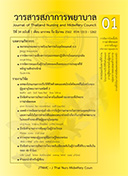Community-Dwelling Older Adults’ Attitudes, Subjective Norm, Perceived Behavioural Control, and Intention to Make Living Wills
Keywords:
intention to make living wills, Theory of Planned Behaviour, attitudes, perceived behavioural control, community-dwelling older adultsAbstract
Objective: To investigate, amongst community-dwelling older adults, the relationships between their attitudes, subjective norms, perceived behavioural control, and intention to make their living wills (statements concerning their choice of end-of-life medical treatment and care).
Design: Descriptive correlation research.
Methodology: The study, using the Theory of Planned Behaviour as a framework, was conducted on a sample of 88 older adults who met the pre-set study criteria, namely, being 60 years old or above and being residents of Bangkok Noi district of Bangkok. Five interview forms were used to collect data pertaining to the participants’ (a) basic factors, (b) attitudes towards making their living wills, (c) compliance with subjective norm on their intention to make their living wills, (d) perceived behavioural control regarding making their living wills, and (e) intention to make their living wills. The data were analysed using descriptive statistics and Spearman’s rank correlation coeffcient.
Results:According to the fndings, the participants’ attitudes towards making living wills were generally moderate (52.3%), and so was their level of compliance with subjective norm (42%). They displayed a fairly high level of perceived behavioural control (61.4%), with a slightly lower livingwill intention level (56.9%). Furthermore, their attitudes and perceived behavioural control were found to have a signifcant positive relationship with their intention (r = .585, p < .01, r = .615, p <.01, respectively), whilst no signifcant relationship was found between their compliance with subjective norm and their intention (p < .05).
Recommendations: Thorough assessment of older adults’ attitudes and perceived behavioural control is highly recommended in the process of encouraging them to make their living wills.
Downloads
References
2010-2040. [Internet]. 2008. [cited Sep 13,2018]. Elderly situation in Thailand (in Thai)
2. Bureau of Policy and Strategy, Ministry of Public Health, 2016. Public health statistics. [Internet].2018. [cited Sep 25, 2018]. Available from https://bps.moph.go.th/new_bps/sites/default/fles/health_strategy2559.pdf (in Thai)
3. Scott K. Incidence of sudden, unexpected death in a specialist palliative care inpatient setting. Palliat Med 2010;24:449–50.
4. Weathers E, Cornally R, Coffey A, Fitzgerald N, Kearns C, Daly N, et al. Advanced care planning:a systematic review of randomised controlled trials conducted with older adults BMJ Support Palliat Care 2016;91:101-9.
5. Bruera S, Chisholm G, Santos RD, Crovador C, Bruera E, Hui D. Variations in vital signs in the last days of life in patients with advanced cancer. J Pain Symptom Manage 2014;48:510–17.
6. Davis CP. Emergency department visits: we are not prepared. Am J Emerg Med; 2012;30:1364-70.
7. Grudzen CR, Richardson LD, Major-Monfried H, Kandarian B, Ortiz JM, Morrison RS. Hospital
administrators’ views on barriers and opportunities to delivering palliative care in the emergency department. Ann Emerg Med 2013;68:654-60.
8. Chung RY, Wong EL, Kiang N, Chau PY, Lau JYC, Wong SY, et al. Knowledge, attitudes, and preferences of advance decisions, end-of-life care, and place of care and death in Hong Kong. A populationbased telephone survey of 1067 adults. J Am Med Dir Assoc 2018;367:e19-27.
9. Portanova J, Ailshire J, Perez C, Rahman A,Enguidanos S. Ethnic differences in advance directive completion and care preferences: What has changed in a decade? J Am Geriatr Soc 2017;65:1352-57.
10. National Health Act B.E. 2550. 1st ed. Nonthaburi:National health commission offce; 2010.
11. Nijinikaree N, Chaowalit A, Hatthakit Urai. The perspectives of end-of-life decisions in chronically ill Thai Muslim patients in the fve border provinces of southern Thailand. APJCP 2008;9:643-7.
12. Ratchawang N. A declaration of intention to rufuse life sustaining of terminal stage patient from eldery perpective in Bangkok [Disertation]. Bangkok: Mahidol university; 2012.
13. Kizawa Y, Yamaguchi T, Yotani N. Advance care planning in cancer care. Gan To Kagaku Ryoho 2016;43:277-80.
14. Ajzen I. Perceived behavioral control, self-effcacy, locus of control, and the Theory of Planned Behavior. J Appl Soc Psychol 2002;32:665-83.
15. Armitage CJ, Conner M. Effcacy of the Theory of Planned Behaviour: a meta-analyticreview. Br J
Soc Psychol 2001; 40:471-99.
16. Polit D, Hungler, B: Nursing research: Principle and method, 6th ed. Philadelphia: Lippincott; 1999. p. 416-417.
17. Institute of Geriatric Medicine Department of Medicine Services Ministry of Public Health.
MMSE–Thai 2002. Bangkok: Ministry of Public Health; 2002. (in Thai)
18. Stelter KL, Elliott BA, Bruno CA. Living will completion in older adults. Arch Intern Med 1992; 152:954-9.
19. Kumpolsiri K. The decision making to exercise the right to die among the elderly in Bangkok [Dissertation].
Bangkok: Mahidol university.; 1999.87
20. Campbell MJ, Edwards MJ, Ward KS, Weatherby N. Developing a parsimonious model for predicting completion of advance directives. J Nurs Scholarsh 2007;39:165-71.








